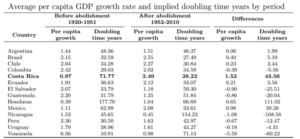The roots of Costa Rica’s demilitarization lie in its political history. In 1948, a disputed presidential election sparked a civil war in Costa Rica. The conflict lasted only 44 days, but it had a profound impact on the country’s political landscape. Following the end of the civil war, Costa Rica’s head of the provisional government junta, Jose Figueres Ferrer, abolished the country’s military. Figueres believed that military spending drained the Costa Rica’s resources and that a lack of military would allow it to put more energy into social programs.
In December of 1948, Costa Rica’s Congress passed a constitutional amendment abolishing the military. The country’s armed forces were disbanded, and the funds previously allocated for military spending were redirected to education, healthcare, and other social programs. Over the years, Costa Rica has maintained a commitment to demilitarization. In the 1980s, it declared its neutrality in the region’s conflicts, including the civil wars in Nicaragua, El Salvador, and Guatemala. The government also pursued a policy of disarmament, which included the destruction of landmines and other weapons.
Today, Costa Rica remains one of the few countries in the world without a standing army. The country has a small, unarmed police force, and its national defense is handled by civilian organizations. Costa Rica’s commitment to peace in Central America has been recognized by the international community, with its president being awarded the Nobel Peace Prize in 1987.
The demilitarization of Costa Rica has had several long-term impacts on its citizens. One of the most notable impacts are its relatively high standard of living compared to other countries in the region. By investing in social programs and infrastructure instead of military spending, Costa Rica has been able to improve the quality of life for its citizens. For example, the country has a high literacy rate, access to healthcare for all, and a strong social safety net. The abolishment of Costa Rica’s military significantly impacted its overall economic development, with the per capita growth increasing significantly and the number of years it would take the country to double its per capita GDP decreasing after the military was officially abolished. These differences, as well as a comparison with neighboring countries before and after this period are displayed in figure 1 (Abarca, 2017).

Another impact of demilitarization is the country’s reputation as a peaceful nation. Costa Rica is cited as a model of democracy and stability in the region, and its decision to forgo military spending is seen as a contributing factor to this reputation. Additionally, the country has been able to use its resources to promote environmental protection and sustainable development, becoming a leader in eco-tourism.
There are, however, some challenges that have arisen because of the Costa-Rica’s lack of a military. One of these is an overstretched police organization, which is responsible for external security as well as local law enforcement. Costa Rica has also had to rely on international organizations and cooperation with neighboring countries to address issues such as drug trafficking and illegal immigration along its borders, and some critics argue that its lack of a military has left it vulnerable to external threats. On the other hand, it is important to note that since the abolishment of Costa Rica’s military, there have been very few episodes of civil or political violence compared to the countries surrounding it, as can be seen in figure 2 (Abarca, 2017).

Overall, the long-term impact of Costa Rica’s demilitarization has been largely positive. The country’s citizens have been able to enjoy a higher standard of living than those residing in surrounding countries, and its reputation as a peaceful nation has brought in significant tourism and investment.
References
Abarca, A. (2017). [PDF] A farewell to arms: The long run developmental effects of costa rica’s army abolishment: Semantic scholar. A farewell to arms: The Long run developmental effects of Costa Rica’s army abolishment | Semantic Scholar. Retrieved March 6, 2023, from https://www.semanticscholar.org/paper/A-farewell-to-arms%3A-The-Long-run-developmental-of-Abarca/664c2890301c454ab9466d74e6a129b0fda00baf
Anderson, R. B. (1998). The Competitive Effects of Political Homogeneity in International Relations: Social Identity Theory and Systemic Analysis. Retrieved March 6, 2023, from https://ciaotest.cc.columbia.edu/conf/ham01/
Dursun-Ozkanca, O. (2017). Pitfalls of Police Reform in Costa Rica: Insights Into Security Sector Reform in non-military countries. Taylor & Francis. Retrieved March 6, 2023, from https://www.tandfonline.com/doi/full/10.1080/21647259.2017.1293350
Horvik, T., & Aas, S. (1981). Demilitarization in Costa Rica: A farewell to arms? International Peace Research Institute, Oslo. Retrieved March 6, 2023, from https://journals.sagepub.com/doi/10.1177/002234338101800403